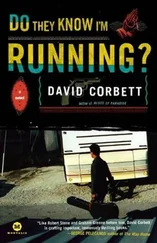A police cruiser appeared up the boulevard, traveling slow. The cabby, she thought, he made the call. The cops wouldn’t think twice about it, not with Cesar packing two guns and dragging that arm around. Not with her barely able to walk, face tattooed with bruises. If they took her into custody, she’d have Felix to worry about all over again. He’d slip someone into jail to kill her. That or bribe some guard to do it.
Cesar was on the far side of the ferry building, out of sight. Gathering up her strength and using the kiosk to block the cruiser’s view, she lurched over to the ugly little man, grabbing at a trash bin and a post along the way.
“How’s it going?” she offered, steadying herself on the kiosk ledge and panting. She looked down at the front page of the paper to hide her face. The small stack of papers on the ledge was weighted down with a rock.
The man inside the kiosk sat atop a tall metal stool. The space around him reeked of sweat and stale cigarettes.
“Buck and a half,” he said in a rasp that suggested cancer. Shel looked. Sure enough, just above his collar, a small clotted scar appeared, and in an instant it brought back Felix, his sitting there in the kitchen with her, clutching her hand, asking if Frank would hold up. Telling her there was nowhere to run.
“Dollar-fifty,” the man said, louder now. His eyes were a flinty green and his breath smelled the way his teeth looked. He held out his hand, the palm concealed beneath a fingerless glove of ratty black wool.
“Let me check,” she said, searching each pocket she knew was empty. The man waited, his breath whistling in and out.
“Well, darn,” she said, glancing over her shoulder. The cruiser had moved on, down the boulevard. “My pal’s got the money.” Cesar had stayed put behind the ferry building; maybe he’d seen the police as well.
“You wanna paper or don’cha?” the man barked. He slid one of the papers from under his rock, folded it over, held it out in one hand while the other extended once again for payment. “Buck and a half,” he said, back at the beginning.
“No thank you,” she said, turning away to lurch and hobble back to her bench. How long, she wondered, sitting down, till another cruiser comes by. This one without warning. Her only chance was to get to the city, connect with Eddy. She’d called from Hidalgo’s apartment, left a cryptic message. Knowing Eddy, he’d already sounded the horn to Danny. That was her chance. And then? She’d fled Danny to save him, now she was running back to save herself. It was cowardly. I’m sorry, she wanted to tell him. Sorry and scared and buying time.
Cesar returned from his hiding place beyond the building, staring after the police cruiser that turned back uphill toward downtown. He collapsed onto the bench beside her.
“Fucking cold out here,” he said, as though nothing had happened. He clutched the lapels of his jacket. His face was damp, but Shel couldn’t tell if it was from rain or sweat.
“Tell me something,” she said. “The men who died, what was the point, exactly?”
Cesar uttered a caustic laugh and wiped his face with his coat sleeve. “You’re funny,” he said.
Shel exhaled and the breath stung as it left her. Tears dammed up behind her eyes for reasons she couldn’t place. “I want you to tell me about the men who died,” she said.
Cesar looked away. Following his gaze, Shel saw terminal derricks in silhouette against the winter morning sky. They looked like skeletal giants clutching one another.
“We got a little speech,” he said, “last night, from Facio, the guy in charge. El Zopilote, he’s called. The Buzzard. He told us, ‘There are cases in which the greatest daring is the greatest wisdom.’ Like that? He read it from a book. After a little more of that horseshit he finally got around to talking about Gaspar Arevalo.”
“He’s who?” Shel asked.
Cesar glanced at her. “I thought you wanted to hear about the men who died.”
“I do.”
“Well, he was the first. The mojado Felix Randall’s people strung up like a dog a few weeks ago.”
“The thing that happened out on Kirker Pass Road?”
Cesar chuckled. “Yes. The thing.” He worked up a wad of spit, let it form at his lips and then dropped it in a long, slow stream to a spot between his feet, inspecting it for blood. “Know what else Facio told us? The guy that road is named for, a norteño named Kirker, he got rich scalping Mejicano peons. Women, children. Pretended they were Apache scalps so he could claim the reward. In Mexico, he’s despised. Up here, they name a highway after him.”
Shel studied his face. It betrayed nothing she did not already know about him. The eyes were the same as always, hard and quick and focused on something a little ways off.
“Nothing like a little local color,” she said finally. “What else did he tell you? This leader of yours, what’s his name- ”
“Facio.”
“Him.”
“He told us to bring honor to ourselves and our families.”
Cesar leaned back, spread his serviceable arm across the back of the bench and cackled. “Honor,” he murmured. “He plays me for a fool. Orders Pepe to shoot me like a pissy little sneak.”
Inside the ferry building a custodian appeared, unlocking the doors one by one. Cesar shot to his feet, wrapped Shel’s arm around his shoulder in a single motion and drew her up after him. Side by side they staggered across the plaza, their bodies leaning against each other till the door came open and they ducked inside.
The interior was a few degrees warmer at best. Cesar planted her in a seat then hurried to the rest room, where, she imagined, he’d run hot water over his hands, splash his face with it. He was gone several minutes, and when he came back out he was as pale as before, warming his hands in his armpits.
“I’ve thought about it,” he said as he sat down next to her. “We’re driving to Chicago. Lot of Mejicanos there, we can blend in.”
He was sweating again, and trembling. His eyes seemed more remote than before.
Shel said, “I’m going to blend in with who?”
“This guy you called,” he said, ignoring her, “who is he?”
“He’s my friend.”
“Friend how?” A blatant inference of sex strained the question.
“We were arrested together.”
Cesar regarded her with a look of barely suppressed relief. And surprise. He seemed impressed.
“Pot smuggling,” she added. “Ten years ago.”
Cesar looked away again. “That doesn’t mean I can trust him,” he said.
“No,” she agreed. “It means you have to trust me.”
Eddy Igo’s body shop sat midway to the beach along the Noriega streetcar line, deep in the heart of San Francisco’s Sunset District. The shop was a single-story cinder-block structure painted daisy yellow and kelly green. Even in the fog, it looked perky. Abatangelo pulled up in front where two work bays faced the street, each with a corrugated aluminum door, above which appeared, in stenciled lettering: I-GO YOU-GO BODY REPAIR.
He entered the customer waiting room, triggering a small bell. There was a vinyl chair, a matching vinyl sofa, an end table covered with grease-stained copies of Car & Driver , a counter with a cash register and Coke machine. Inside the work bay, the chassis of a VW Bug sat hoisted on a hydraulic rack, its roof cut away and its hood removed. A 3100 engine hovered over it, machined for oversized cylinders and suspended by pulley chains. Coiled rubber hoses hung from grapples. A smell of gasoline and cold metal hung in the air.
The place was still. Abatangelo called out Eddy’s name.
A moment’s silence, then from the back: “Danny, yeah. Back here.”
Читать дальше












